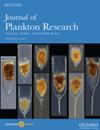Hydrostatic pressure impedes the degradation of sinking copepod carcasses and fecal pellets
IF 2
3区 环境科学与生态学
Q2 MARINE & FRESHWATER BIOLOGY
引用次数: 0
Abstract
Fast-sinking zooplankton carcasses and fecal pellets appear to contribute significantly to the vertical transport of particulate organic carbon (POC), partly because of low temperature that decreases microbial degradation during the descent into the deep ocean. Increasing hydrostatic pressure could further reduce the degradation efficiency of sinking POC, but this effect remains unexplored. Here, the degradation of carcasses and fecal pellets of the abundant marine copepod Calanus finmarchicus was experimentally studied as a function of pressure (0.1–100 MPa). Samples were either exposed to elevated pressure in short 1-day incubations or a gradual pressure increase, simulating continuous particle sinking during a 20-day incubation. Both experiments revealed gradual inhibition of microbial respiration in the pressure range of 20–100 MPa, corresponding to 2–10-km depth. This suggests that hydrostatic pressure impedes carbon mineralization of fast-sinking carcasses and fecal pellets and enhances the deep-sea deposition rate of zooplankton-derived organic material.静水压力阻碍下沉的桡足类尸体和粪便颗粒降解
快速下沉的浮游动物尸体和粪便颗粒似乎对颗粒有机碳(POC)的垂直迁移有很大作用,部分原因是低温降低了微生物在沉入深海过程中的降解能力。静水压力的增加可能会进一步降低下沉过程中颗粒有机碳的降解效率,但这一影响尚未得到研究。在此,实验研究了丰富的海洋桡足类(Calanus finmarchicus)的尸体和粪便颗粒的降解与压力(0.1-100 兆帕)的关系。在短短 1 天的培养过程中,样品暴露在升高的压力下,或者在 20 天的培养过程中,模拟颗粒持续下沉,使压力逐渐升高。两项实验都表明,在 20-100 兆帕的压力范围内(相当于 2-10 千米深度),微生物呼吸逐渐受到抑制。这表明,静水压力会阻碍快速下沉的尸体和粪便颗粒的碳矿化,并提高浮游动物产生的有机物质的深海沉积率。
本文章由计算机程序翻译,如有差异,请以英文原文为准。
求助全文
约1分钟内获得全文
求助全文
来源期刊

Journal of Plankton Research
生物-海洋学
CiteScore
3.50
自引率
9.50%
发文量
65
审稿时长
1 months
期刊介绍:
Journal of Plankton Research publishes innovative papers that significantly advance the field of plankton research, and in particular, our understanding of plankton dynamics.
 求助内容:
求助内容: 应助结果提醒方式:
应助结果提醒方式:


